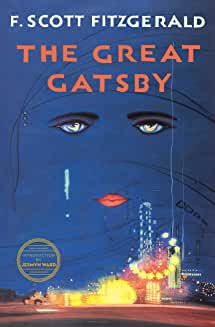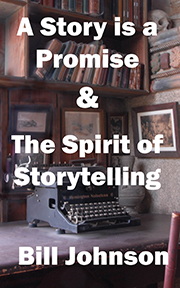|
|
| Other Play Reviews on This Site |
|
|
| About the Author |
Writing About Class in America
Notes on The Great Gatsby
by Bill Johnson 
The Great Gatsby was published in 1925. At that time, the world still very much revolved around class, caste, and tribe. In England, you were born into a class. In India, a caste. In Iraq, a tribe.
In America, even in 1925, there was an idea that someone by talent, luck, or money could change their class.
Fitzgerald's novel explores that idea.
Nick, the novel's narrator, is born into the respectable upper middle class, from a clan that made its money from hardware stores, but in the past also had a title. Nick has decided to move east and sell bonds. But just as important for the novel is Nick's character. Nick is 'inclined to reserve all judgments, a habit that has opened up many curious natures to me.'
He also happens to be the 2nd cousin once removed of Daisy, a young woman of a wealthy family, married to Tom, a brute also from a family of wealth, who Nick met in college. Reading the descriptions of Daisy one is reminded of the female gods of Olympus, while Tom is one of the petty male gods who by class must sire progeny with a female goddess while by temperament prefers sex with human females.
Fitzgerald makes the point that those of great wealth exist in a kind of world of opulence that sits above in a golden glow.
Then there is Gatsby, of whom Nick relates, 'Gatsby, who represented everything for which I have an unaffected scorn. If personality is an unbroken series of successful gestures, then there was something gorgeous about him, some heightened sensitivity to the promises of life ... it was an extraordinary gift for hope, a romantic readiness...'
Gatsby seeks to use ostentatious displays of money and romantic readiness to woo Daisy, who he met as a penniless army officer, away from Tom.
The question of the novel is can he use the power of his personality to create the appearance of a world of wealth to re-capture Daisy?
While Gatsby seeks to define a new life for himself, Nick describes Tom as 'one of those men who reach such an acute limited excellence at twenty-one that everything afterward savors of anticlimax.'
Tom wears Daisy like a jewel that reflects back on him. Nick says of the radiant Daisy, 'It was the kind of voice that the ear follows up and down, as if each speech is an arrangement of notes that will never be played again. Her face was a promise that she had done gay, exciting things just a while since and that there were gay, exciting things hovering in the next hour...'
While Daisy is radiant, Nick's description of the house makes if feel as if the main building material is soft, glowing light.
Every detail Fitzgerald choose to describe the wealthy conveys this aura. He is writing to a purpose that evokes a particular world; he's not just accumulating details.
Some writers struggle because the physical details they use lack a subtext of meaning. They aren't meant to convey anything of value in a story world.
Fitzgerald demonstrates his subtext just as powerfully when he describes the land and homes of the nearby poor.
'This is a valley of ashes--a fantastic farm where ashes grow like wheat into ridges and hills and grotesque gardens; where ashes take the form of houses and chimneys and rising smoke and, finally... of men who move dimly and already crumbling through the powdery air ... and immediately the ash-gray men swarm up with leaden spades and stir up an impenetrable cloud, which screens their obscure operations from your sight.'
To read this is to evoke the experience of the lives of the poor, not just to describe those lives.
In the next chapter, Tom takes Nick along to meet Tom's mistress, the wife of a mechanic who runs a dilapidated repair shop. In an apartment Tom rents in New York. she invites a sister and the sister's friends, who are a collection of working poor. They all circle Tom hoping for work or a letter of introduction they can use to get work on Long Island.
Fitzgerald has described another class in America in the 1920s with brutal clarity. These details have a purpose that serves and advances the story. They ring true because they serve that purpose.
I come across a debate by new writers about starting a story with a prologue. Such prologues often fail because they exist to offer details and back story about a story world ahead of giving those details a context.
Next there is a party put on by Gatsby. Nick suspects he's one of the few invited. It's the typical party with free food, music, dancing, and entertainment that brings out a throng from New York. Gatsby's mansion is swarming with well-heeled guests who riotously take in his free booze and food while they dance the night away.
In the 20s life seemed faster in America, and in cities there was now a class that partied and celebrated the good life. Fitzgerald captures that world, a world Nick has never known.
At the party, the longer Nick drinks, 'the scene had changed before my eyes into something significant, elemental, and profound.'
When Nick finally meets Gatsby, he's both highly impressed and also unimpressed, that Gatsby comes across as 'an elegant young roughneck.'
Then, when Gatsby takes Nick for a drive, Gatsby relates to Nick the story of his life, heavy on story. Hearing Gatsby relate his lineage and heroic war exploits, to Nick '...it was like skimming hastily through a dozen magazines.'
Nick now understands that Gatsby's upper class background is a self-created mirage.
Then Gatsby shows a photo of himself with other young man at Oxford, and a medal for heroism from the war, and now Nick believes in Gatsby again.
Now Gatsby relates the real reason he is taking Nick to lunch. He wants him to meet with a friend of Daisy's Nick has spent time with. The friend conveys that when Gatsby and Daisy met, they had feelings for each other, but he went off to war and she married Tom and his wealth. The upshot, that Nick will invite Daisy to tea at Nick's house, and Gatsby will make an appearance.
When Gatsby and Daisy meet, after an awkward beginning, it appears 'love;\' is in the air.
I set off the word love here. As a side note, I'm interested in what animates an author. While Fitzgerald has a brilliant eye for observing the details of social class, expressing love eludes him. Everyone in the novel is maneuvering for some external purpose, like life is a stage and they are making decisions about how to scale their performance for an intended effect.
Returning to the novel, as the meeting continues, the flummox ed Gatsby can't always keep the lies about his history straight when he's speaking to Nick.
And Nick wonders if Gatsby's fantasy of Daisy matches up to the reality. 'No amount of fire or freshness can challenge what a man will store up in his ghostly heart.'
This line connects directly to the last line of the novel, which I'll set out later.
Gatsby's story is that an impoverished young man he met a millionaire on a yacht to escape a capricious wife. The outcome is five years in his service that helps Gatsby create an image of himself as a person of means. He now looks the part on this coming stage of his life, how to play being wealthy and sophisticated.
Now that Tom has met Gatsby and seen the connection with Daisy, he's determined to know more.
Daisy has told Gatsby that they can't go back to a time she wasn't married, but he expects her to walk away from his current marriage.
Nick finally realizes what makes Daisy's voice so magical and beguiling. It suggests money. 'High in a white palace, the king's daughter, the golden girl....'
When Daisy admits she loves Gatsby, Tom tries to defend his marriage by saying Gatsby uses drug stores to sell illegal alcohol. That he's a common criminal trying to pass himself off as American nobility.
Then, in an accident driving Gatsby's car, Daisy kills Tom's mistress, but Gatsby is prepared to say he was driving. Before the police can become more involved, Tom convinces his mistress's walking dead poor husband that Gatsby killed his wife.
Gatsby is killed by the husband.
As Nick struggles to get others to join him at the funeral, he meets Gatsby's father, a hard working man of a lower class. As the father talks about his son to Nick, this was the one time in the novel I felt one character had genuine feelings about another. It also conveys the life Gatsby (Gatz) was trying to escape, and that special moment with Daisy he was trying to recreate.
Only one of the hundreds who attended Gatsby's grand parties shows up at the funeral, an older man who was shocked that Gatsby had real books in his library, not cardboard cutouts.
Nick now thinks of Tom and Daisy, '...they smashed up things and creatures and then retreated back into their money or their vast carelessness ... and let other people clean up the mess they made.'
The novel ends with a thought of Nick, 'So we beat on, boats against the current, borne back ceaselessly into the past.'
Each of the main characters, Gatsby, Nick, Tom, all find themselves trying to recapture a magical moment/time in their lives. Even Daisy, meeting Gatsby again, can relive a time in her life when she was courted by young beaus.
Even Nick began life believing the heart of the mid-west was the center of the universe, but found going overseas that it wasn't even 'the ragged edge of the universe.'
In his own life, Fitzgerald had a magical year at Princeton when every possibility of life to a creative young man seemed to be opening. The next year it closed and he joined the military.
All the main characters have lost something they can't regain.
Gatsby managed to accomplish much with his life through a projection of a persona, but his attempt to fulfill the American Dream through the creation of a persona eluded him.
The Great Gatsby is a wonderful example of how an author can use searing details to bring a story world to life.
Top of page
